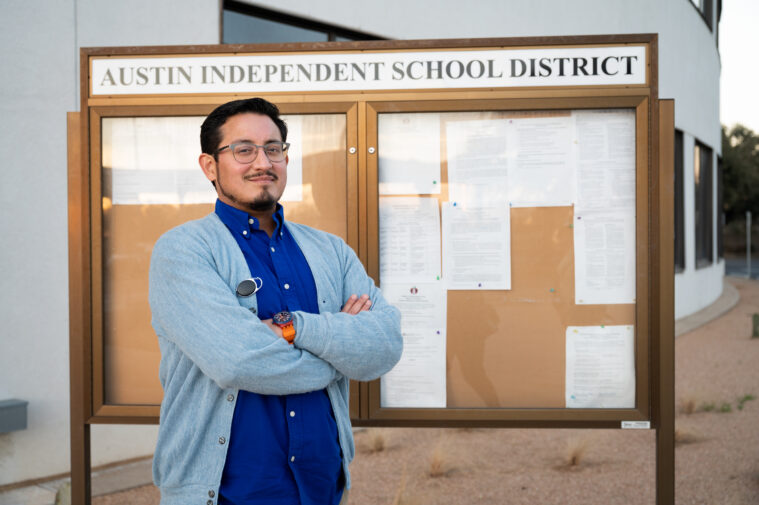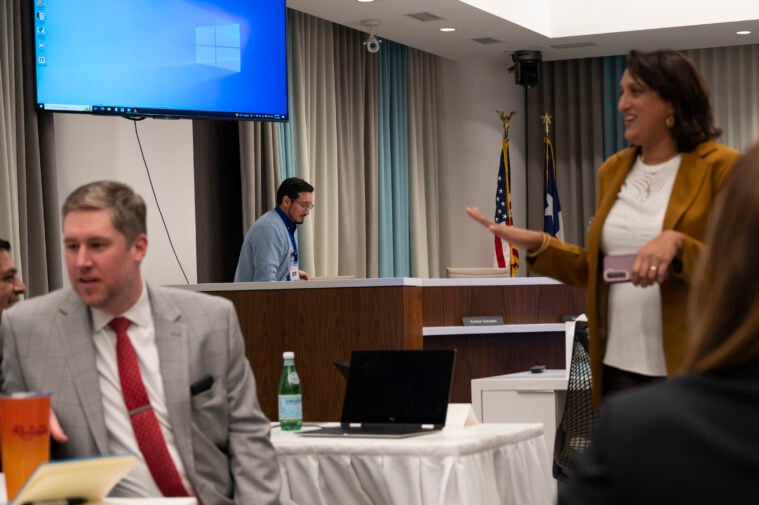Andrew Gonzales never expected his name to be on a ballot. The 30-year-old native Austinite had taught for seven years in the Austin Independent School District (AISD) before quitting in October 2021—joining an exodus of instructors fleeing the pains and indignities of Texas’ public schools. Then, last November, Gonzales shocked the local political scene by ousting Austin’s sitting school board president, earning himself a board seat from which to try to fix the problems that drove him out of teaching.
Gonzales, whose campaign was endorsed by the Austin American-Statesman and Mothers Against Greg Abbott, has spent much of his life on AISD property: as a student, the son of a teacher, a mentor and substitute, and finally a full-time instructor. But the stresses of working during the pandemic, when teachers were expected to meet lofty instructional goals without proper resources or compensation, proved too much. In resigning, he became part of the nearly 17 percent of teachers statewide who left their teaching positions—either for other teaching opportunities or other careers—during the 2021-22 school year. Now, he plans to prioritize teacher retention and mental health for staff and students as a board member.
The Texas Observer spoke with Andrew Gonzales about the pressures teachers face and what school districts can do to support them—and keep them from leaving en masse.
Tell me about your experience with the public school system as a kid.
I am a graduate of AISD. I have lived in the district my entire life. My mom was also a teacher in the district—not only her, but multiple aunts, uncles, cousins have also worked for AISD. They always made sure that I had what I needed, and they were very ardent defenders of my public education. So I had a pretty good experience as a student in AISD, although that was not necessarily the case for everybody.

Was there a particular point in the last few years that made you rethink your decision to be a teacher?
It was the disillusionment during the pandemic. The demoralization was so great that I just couldn’t do it anymore. It wasn’t tenable. Expectations on teachers did not change. When we came back into the classroom full-time, the demand and the expectation for academic growth was at the same place, but without any extra allocation of resources in a meaningful way to get to that end.
So you decide to leave, then you decide to reenter the fray as a school board candidate for the district you just left. It’s an interesting choice.
I guess because I’m really crazy. I left a profession where I was getting way under-compensated now to take a different role in this district that is not compensated at all. I cannot give you a rational reason I would do that, other than that I just really love this district. I really care about the mission, the value of public schooling. We’re heading toward death by a thousand cuts as a public school system and as a country.
What does AISD—and other large school districts in Texas—need to do to get teachers like you to stay?
The obvious low-hanging fruit is compensation. Teachers and all the support staff who make up the ecosystem of a campus need to be able to afford to live. My mom and I overlapped in the classroom for one year. When her final year ended, she was making barely more than I was making at the start, and that was after 36 years. So the initial compensation that teachers receive when they enter the profession, but also the schedule of salary increase over time, needs to get better.
But even if you paid someone $80,000, it’s not enough if the district does not have functional systems of support. My colleagues and I often stepped in to meet needs like serving as a counselor informally for students because there just isn’t somewhere where I can send them, or the place that I can send them is overwhelmed with demand. We need to beef up the ways that we support special education students, students who are having mental health struggles, and our multilingual students. It contributes to the disillusionment that teachers feel when they’re pouring everything out of their own personhood to support those students with those needs, and there isn’t a structure to support them.
This legislative session, there are a lot of education-related things up in the air, including the funding system. Do you think Texas’ current school funding setup is working?
No. The volume of demand for services to meet students’ needs has dramatically increased as a result of the pandemic. In addition to that, our basic allotment as a state has not been adjusted in four years, and we’re all living through what was a very real period of inflation. So the costs associated with educating those students have dramatically increased. I do not think that our current model is functional, particularly for urban districts in our state.
“I left a profession where I was getting way under-compensated now to take a different role in this district that is not compensated at all. I cannot give you a rational reason I would do that, other than that I just really love this district.”
A lot of the proposed bills are about things like curriculum and parental involvement. In your opinion, is that something we should be focusing on?
What you just brought up is another factor that contributed to the mass exodus of teachers. It’s no surprise to me that these assaults on academic freedom, and what these right-wing politicians are insinuating about the motives of public educators across the state, are discouraging teachers. And at the rate that we’re compensated? Why would I want to stick around in this profession?
In your experience, are students feeling the strain of the teacher shortage?
Yes. And they are feeling it at ages that you would be surprised to hear. I’ve had second- and third-graders bring up mental health.
I do absolutely think we need to beef up our literacy instruction—the number of students who are literate in third and fourth grade is much too low, and it’s been too low for too long. But we need to understand that there are foundational things that have to be laid before we can get to that point. So yes, I’m hearing from students in high school and middle school, for sure, but even as low as the elementary grades, that something is very wrong here.
There’s so many different things that are out there in the ether, it’s impossible for them not to pick up on the fact that something is amiss.








